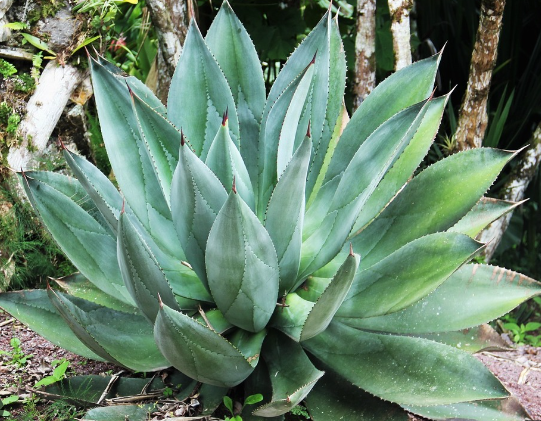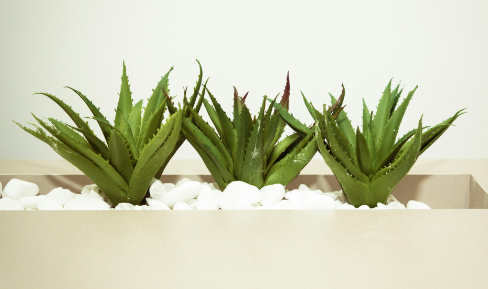Are you wondering if deer eat aloe plants? You’re not alone.
Aloe vera is a popular succulent known for its soothing gel, but it often raises questions about its place in a garden visited by wildlife.
Despite their reputation for nibbling on garden plants, deer usually do not eat aloe vera. The plant’s bitter compounds, like saponins and anthraquinones, deter these animals from making it a part of their diet.

This could be great news if you’re looking to protect your aloe plants from these common garden pests.
While deer may occasionally sample a variety of plants, they generally steer clear of aloe vera due to its taste and texture. However, you may still need to watch out for other critters like snails, slugs, and beetles, which find aloe quite appealing.
Understanding which animals are likely to munch on your aloe plants can help you take the right precautions to keep them safe.
Gardens are a haven for many creatures, but with the right knowledge, you can enjoy your aloe plants without worry.
Do Deer Eat Aloe Plants?
Deer are known to browse a variety of plants in gardens and wild areas. Succulent plants like aloe vera are no exception to their diet.
They are adaptable feeders and can eat many kinds of vegetation, depending on availability.
Aloe vera plants have fleshy leaves filled with gel. This gel provides moisture and some nutrients.
Although not a primary food source, deer may consume aloe vera leaves when other food is scarce.
Evidence suggests that deer do not actively seek out aloe vera. They prefer plants with higher nutrition. Yet, in a pinch, they might nibble on aloe leaves.
Interestingly, aloe vera has some natural defense mechanisms. It contains bitter compounds like saponins and anthraquinones. These can deter many animals, but deer might still eat the plant.
You can protect your aloe vera plants by using some barriers.
A mesh or screen can make it harder for deer to access the plants. Keeping aloe in a fenced area is also a good idea. This can prevent deer from munching on your succulents.
Are Aloe Plants Deer Resistant?

Aloe plants are generally less likely to be eaten by deer. The primary reason is that aloe plants have sharp edges and a tough texture.
Deer often avoid prickly plants. They prefer softer, more palatable vegetation. Aloe vera’s structure makes it less appealing to their taste.
Keep in mind:
- While aloe plants are not the first choice for deer, they may still eat them if food is scarce.
- Aloe plants can be slightly toxic, adding another layer of deterrence.
Though no plant is 100% deer-proof, many gardeners consider aloe to be a good option in areas with deer activity.
If you want to increase your garden’s deer resistance, you can combine aloe with other deer-resistant plants like agave and cactus.
How To Keep Deer From Eating Aloe Plants

Deer often find aloe plants attractive, but there are ways to protect your garden from deer.
Fencing is one of the most effective methods.
Install a tall fence, at least 8 feet high, around your garden. You can use chicken wire or other sturdy materials.
Planting certain species around your aloe plants can act as natural deterrents.
Lavender, rosemary, and marigold are examples of plants deer tend to avoid. Integrating these into your garden can help protect your aloe plants.
For additional protection, you can use netting or physical barriers.
Cover your aloe plants with netting or place barriers like butterfly weed and Russian sage around them. These physical deterrents make it harder for deer to reach the plants.
Will Aloe Plants Grow Back After Being Eaten By Deer?

Aloe plants can suffer significant damage from deer. Regrowth depends on the extent of the damage. If care is given promptly, your aloe plants may recover and thrive again.
Steps To Help Your Aloe Plants Recover From Deer Damage
Priority should be given to protecting the remaining parts of the plant.
Consider putting up a barrier around the aloe to prevent further deer damage. Simple fencing or mesh can be effective.
After that, inspect the damage. Remove any leaves that are too damaged to heal. This not only promotes new growth but also keeps the plant healthy.
Provide extra care to your aloe plants.
Ensure they receive adequate sunlight, and water them appropriately. Avoid overwatering, as aloe is sensitive to too much moisture.
Finally, give your aloe plants some time.
The young, tender leaves are the first signs of regrowth. Be patient and maintain their care routine consistently.
Understanding Deer’s Diet And Aloe Plants
Deer are herbivores that prefer leaves, twigs, and shoots for their nutrients. Aloe plants offer moisture and a range of essential nutrients.
Seasonal Variations In Deer’s Diet
During spring and summer, deer mainly consume fresh leaves, herbs, and flowers. This is when plants are lush, providing ample nutrients essential for their growth.
In fall and winter, food becomes scarce.
Deer then turn to woody plants, twigs, and even the bark of trees. In drought conditions, they may seek out aloe plants due to the moisture content.
Aloe plants can store water, making them a valuable resource during dry periods.
Deer nibble on the fleshy leaves to hydrate, showing their adaptability in finding moisture sources.
What About Other Wildlife And Aloe Plants?
Aloe plants are popular, not just with deer, but also with other wildlife. They can attract a range of animals, which you may want to be aware of.
Rodents, like squirrels and gophers, sometimes munch on aloe vera. They typically take small bites to quench their thirst.
Garden pests such as snails, slugs, and beetles regard aloe vera as a tasty treat. Despite the plant’s natural defenses like bitter compounds, these pests can still cause significant damage.
Rabbits are another common visitor. Aloe vera provides moisture and nutrients, making it an appealing snack for them.
Raccoons are quite versatile. They eat a wide variety of foods and might nibble on your aloe plants, especially if other food is hard to find.
Tortoises and iguanas also find aloe plants appealing, especially in dry environments where the plants are a good source of hydration.
Here is a quick overview of other succulents and the wildlife they attract:
| Succulent Type | Commonly Attracted Wildlife |
|---|---|
| Agave | Rodents, deer |
| Cactus | Birds, insects |
| Sempervivum | Slugs, snails |
| Sedum | Rodents, rabbits |
| Echeveria | Insects, snails |
Goats are opportunistic feeders and might munch on aloe plants if they are within reach.
